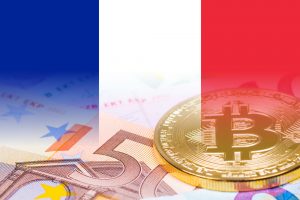
In recent regulatory news, the United States Office of Government Ethics has issued a document advising employees of the U.S. executive branch to disclose their cryptocurrency holdings. In other news, Bank of Korea has rejected the notion of central bank-issued digital currencies, Crypto Finance AG has received licensing from the Swiss Financial Market Supervisory Authority (FINMA), and France is expected to develop a framework for regulating initial coin offerings (ICOs) by 2019.
Also Read: Financial Services Provider Square Acquires New York Bitlicense
U.S. Office of Government Ethics Advises Employees of Executive Branch to Disclose Crypto Holdings
 The United States Office of Government Ethics has published a legal advisory that requires all employees of the U.S. executive branch to disclose their virtual currency holdings.
The United States Office of Government Ethics has published a legal advisory that requires all employees of the U.S. executive branch to disclose their virtual currency holdings.
The advisory states that “U.S. Office of Government Ethics (OGE) has determined that virtual currency is ‘property held . . . for investment or the production of income’ for purposes of public and confidential financial disclosure, pursuant to the Ethics in Government Act. […] Executive branch employees are therefore required to report their holdings of virtual currency on their public or confidential financial disclosure report, subject to applicable reporting thresholds for property held for investment or the production of income.”
The advisory also makes note of potential conflicts of interest that may arise through government employees owning crypto assets, stating, “Virtual currency is an investment asset and, like other property held for investment, it may create a conflict of interest for employees who own it. Furthermore, it is not subject to the conflict of interest exemptions in 5 C.F.R. part 2640. Agency ethics officials should, therefore, analyze whether their employees’ official duties would have an effect on the value of their virtual currency, just as they would any other property held for investment or the production of income. They should also alert their employees to the potential conflict of interest risk posed by ownership of virtual currency.“
Bank of Korea Rejects Central Bank-Issued Digital Currencies
 Korea’s central bank, Bank of Korea, has flatly rejected the notion of central bank-issued cryptocurrencies. A report issued by the bank concluded: “It’s desirable that the BOK is the only entity to entirely control issuing money.”
Korea’s central bank, Bank of Korea, has flatly rejected the notion of central bank-issued cryptocurrencies. A report issued by the bank concluded: “It’s desirable that the BOK is the only entity to entirely control issuing money.”
In the report, Kwon Oh-ik, a researcher at Bank of Korea’s economic research institute stated: “We reviewed the possible feasibility of digital currencies as currency; however, our thoughts are that digital currencies have been exposed to various categories of risk associated with credit, liquidity and legal management.”
Kwon also stated that “Technology improvements don’t mean private sectors will be allowed to have the rights for money issuance. If this happens, the BOK should regulate them but properly.”
Crypto Finance AG Gains FINMA Licensing
 Crypto Finance AG, a Zug-headquartered company providing financial services pertaining to cryptocurrencies, has successfully received licensing from the Swiss Financial Market Supervisory Authority. The licensing makes the firm a legitimate distributor of collective investment schemes in Switzerland.
Crypto Finance AG, a Zug-headquartered company providing financial services pertaining to cryptocurrencies, has successfully received licensing from the Swiss Financial Market Supervisory Authority. The licensing makes the firm a legitimate distributor of collective investment schemes in Switzerland.
Jan Brzezek, the chief executive officer and founder of Crypto Fund AG, stated: “For us, getting the FINMA license is a big step in the right direction, to establish us as the first point of contact for crypto assets.”
France Expected to Regulate ICOs by 2019
 A forthcoming bill providing regulatory guidelines for initial coin offerings is expected to be delivered to the French Council of Minister this month.
A forthcoming bill providing regulatory guidelines for initial coin offerings is expected to be delivered to the French Council of Minister this month.
A report published by law firm Kramer Levin states that “The proposed legislation would introduce a new chapter to Book V, Title V of the French Monetary and Financial Code, or CMF, which will be renamed ‘Intermediaries in Miscellaneous Property and Token Issuers.’ Chapter 2 of Title V will be titled ‘Token Issuers’ and will detail the rules applicable to ICOs in articles L. 550-6 et seq.”
“Chapter 2 provides a definition of tokens, indicating that a token is intangible property representing, in numerical form, one or more rights that can be issued, registered, conserved or transferred using a shared electronic registration mechanism that facilitates the identification, directly or indirectly, of the owner of said property. It also defines an ICO as any offer to the public, in any shape or form, to purchase tokens. However, it excludes offers made to a small number of buyers. Under the proposed legislation, the issuer should notify token buyers of the status of the project the ICO funds were used to finance, and of the establishment of any secondary market for the tokens,” the report continues.
Kramer Levin characterizes the proposed regulations as differing significantly from the legislative apparatus adopted by other nations – arguing that France is moving toward the development of a unique regulatory framework from the ground up, as opposed to attempting to apply existing securities laws to the virtual currency sector.
Do you think that employees of the U.S. executive branch should be required to disclose their cryptocurrency holdings? Share your thoughts in the comments section below!
Images courtesy of Shutterstock, Wikipedia, Finma.ch
Want a comprehensive list of the top 500 cryptocurrencies and see their prices and overall market valuation? Check out Satoshi Pulse for all that hot market action!
The post Regulations Round-Up: U.S. Executive Branch Employees to Disclose Crypto Holdings, French ICO Regulations Coming by 2019 appeared first on Bitcoin News.

Bitcoin.com is author of this content, TheBitcoinNews.com is is not responsible for the content of external sites.
Our Social Networks: Facebook Instagram Pinterest Reddit Telegram Twitter Youtube










